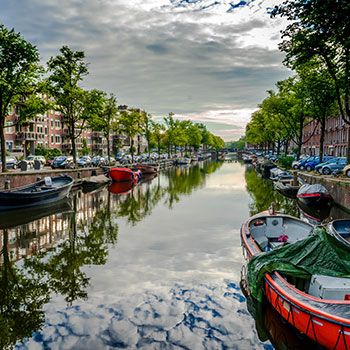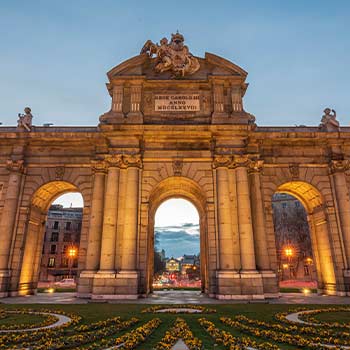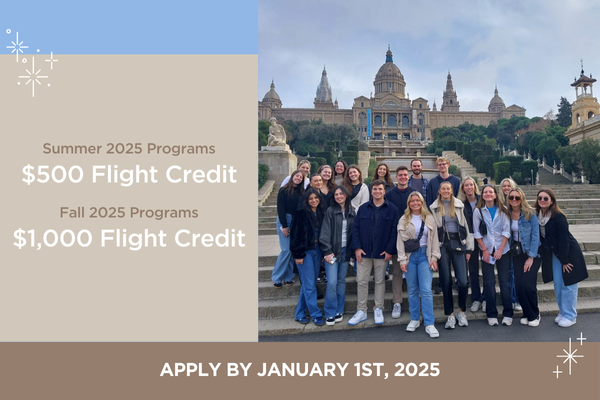New Venture Creation in the Amsterdam Entrepreneurial Ecosystem
Summer in Amsterdam Program
Amsterdam, Netherlands
Dates: early Jul 2025 - mid Jul 2025

New Venture Creation in the Amsterdam Entrepreneurial Ecosystem
OVERVIEW
CEA CAPA Partner Institution: Vrije Universiteit Amsterdam
Location: Amsterdam, Netherlands
Primary Subject Area: Business
Instruction in: English
Transcript Source: Partner Institution
Course Details: Level 300
Recommended Semester Credits: 2.5
Contact Hours: 38
DESCRIPTION
The creation of new ventures is one of the most important economic issues of this time, all over the world. The creation of new ventures is not limited to start-ups only, but also applies to the development of new activities by existing firms (among them corporates) and spin-offs by universities, company expansions, take-overs, and scale-ups, and much more.
Amsterdam offers a broad and interesting palette of entrepreneurs, firms and entrepreneurial organizations, this is called the Amsterdam entrepreneurial ecosystem. The Center for Entrepreneurship of the Vrije Universiteit Amsterdam (CfE@VU) plays an important role in the Amsterdam entrepreneurial ecosystem. Therefore, this international summer school is the right opportunity to study new venture creation and entrepreneurship.
This course follows a double approach. The first approach is the sustainable entrepreneurship approach, dealing with the economic, social and ecological aspects of new ventures. The second approach is the life cycle of the firm approach, dealing with the changes of the firm and the entrepreneur during the life cycle of the firm.
Next to above mentioned approaches, an important part of the content of this course is determined by the students themselves, who are expected to come up with their own business ideas and contributions, guided by the course lecturers.
After morning lectures which discuss topics as the Business Model Canvas for Start-ups and Scale-ups and the Amsterdam entrepreneurial ecosystem, in the afternoons the students work on practical assignments, with additional support from outside experts.
The course ends with the elevator pitches of the team assignments, in a Dragon's Den/Shark Tank setting.
By the end of this course, students will:
1) Be familiar with an innovation outlook on entrepreneurship.
2) Be aware that value-adding opportunities not only contain financial aspects but also social and environmental aspects (sustainable entrepreneurship).
3) Have developed insight into, and actual developed, their own enterprising competencies.
4) Have learned about the processes involved in the recognition and exploitation of opportunities, about creating societal value, and about the nature and role of networks.
5) Have gained the ability to write a feasibility plan on how to bring an innovation to the market.
Morning lectures will discuss topics such as the Business Model Canvas for Start-ups and Scale-ups and the Amsterdam entrepreneurial ecosystem.
In the afternoon, students will work on practical assignments, with additional support from outside experts.
The course ends with the online elevator pitches of the team assignments, in a Dragon?s Den/Shark Tank setting.
The assessment takes place along three lines:
1) Team assignment Business Model Canvas (Innovativeness (25%); Technological feasibility (25%); Commercial feasibility (25%); Pitch & Discussion (25%); Completeness of the report (points deduction); Readability of the report, points deduction). This line represents 50% of the final grade.
2) Essay (This will be assessed on the basis of persuasiveness. Ambiguity of the proposition and poor readability of the essay may lead to deduction of points). This line also represents 50% of the final grade.
3) Four small assignments (they will be assessed on the basis of Pass/Improve/Fail).
Contact hours listed under a course description may vary due to the combination of lecture-based and independent work required for each course. CEA CAPA's recommended credits are based on the contact hours assigned by Vrije Universiteit Amsterdam (VU Amsterdam): 15 contact hours equals 1 U.S. credit
Amsterdam offers a broad and interesting palette of entrepreneurs, firms and entrepreneurial organizations, this is called the Amsterdam entrepreneurial ecosystem. The Center for Entrepreneurship of the Vrije Universiteit Amsterdam (CfE@VU) plays an important role in the Amsterdam entrepreneurial ecosystem. Therefore, this international summer school is the right opportunity to study new venture creation and entrepreneurship.
This course follows a double approach. The first approach is the sustainable entrepreneurship approach, dealing with the economic, social and ecological aspects of new ventures. The second approach is the life cycle of the firm approach, dealing with the changes of the firm and the entrepreneur during the life cycle of the firm.
Next to above mentioned approaches, an important part of the content of this course is determined by the students themselves, who are expected to come up with their own business ideas and contributions, guided by the course lecturers.
After morning lectures which discuss topics as the Business Model Canvas for Start-ups and Scale-ups and the Amsterdam entrepreneurial ecosystem, in the afternoons the students work on practical assignments, with additional support from outside experts.
The course ends with the elevator pitches of the team assignments, in a Dragon's Den/Shark Tank setting.
By the end of this course, students will:
1) Be familiar with an innovation outlook on entrepreneurship.
2) Be aware that value-adding opportunities not only contain financial aspects but also social and environmental aspects (sustainable entrepreneurship).
3) Have developed insight into, and actual developed, their own enterprising competencies.
4) Have learned about the processes involved in the recognition and exploitation of opportunities, about creating societal value, and about the nature and role of networks.
5) Have gained the ability to write a feasibility plan on how to bring an innovation to the market.
Morning lectures will discuss topics such as the Business Model Canvas for Start-ups and Scale-ups and the Amsterdam entrepreneurial ecosystem.
In the afternoon, students will work on practical assignments, with additional support from outside experts.
The course ends with the online elevator pitches of the team assignments, in a Dragon?s Den/Shark Tank setting.
The assessment takes place along three lines:
1) Team assignment Business Model Canvas (Innovativeness (25%); Technological feasibility (25%); Commercial feasibility (25%); Pitch & Discussion (25%); Completeness of the report (points deduction); Readability of the report, points deduction). This line represents 50% of the final grade.
2) Essay (This will be assessed on the basis of persuasiveness. Ambiguity of the proposition and poor readability of the essay may lead to deduction of points). This line also represents 50% of the final grade.
3) Four small assignments (they will be assessed on the basis of Pass/Improve/Fail).
Contact hours listed under a course description may vary due to the combination of lecture-based and independent work required for each course. CEA CAPA's recommended credits are based on the contact hours assigned by Vrije Universiteit Amsterdam (VU Amsterdam): 15 contact hours equals 1 U.S. credit






